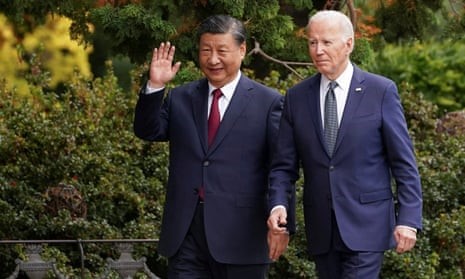“The most important bilateral relationship in the world” – Xi Jinping thus described the US-China relations as the two leaders met last week for the first time in nearly four years amid strained relations.
The Guardian said, “The US and China cannot afford a rancorous economic breakup, much less a war. A few of the most pressing global challenges, from artificial intelligence to the climate crisis to global health, cannot be tackled if the two countries cannot sit across the table from one another and talk… Biden deserves credit for pushing ahead with the summit despite a heated and often nationalistic US political context in which suspicion about China has been rising…”
Biden wanted to stabilise the geopolitical relationship and make it strategically more predictable. Progress was achieved in restoring mil-mil communication.
For Xi Jinping, the overwhelming domestic driving force has been a weakening Chinese economy. The growth numbers are bad; consumer confidence remains low. The depth of the Chinese economic slowdown necessitated a fundamental relook at mutual relationships as geopolitical instability (among other factors) has impacted international as well as domestic investors. Bringing the geopolitical temperature down serves their underlying economic interests, said Kevin Rudd in a conversation with Fareed Zakaria on CNN.
Xi’s target was the boardroom. At the APEC CEO summit, he invited businesses across the world to invest & deepen their footprint in China, promising action on the list of items that irk foreign investors, from IP theft to data security.
The two sides made little headway on China’s request to reduce US restrictions on Chinese companies. They reached agreements covering fentanyl, military communications & AI.
As per Kevin Rudd, there was no significant change in the official Chinese formulation. The Chinese policy has been focused on – do not economically coerce our allies, achieve progress on mil-mil, and increase collaboration on climate change. Taiwan remains the red line.
Overall, the much hyped four-hour meeting signalled no structural shift in ties, but a tactical pause in hostilities. US corporates have welcomed the talk of political stability and mil-mil communications. However, they would like to see real progress on the ground – whether there is real de-escalation across the straits (like Chinese planes not crossing the median line in the Taiwan Straits or China not militarily and economically coercing the new Taiwanese President after assuming power in January 2024, whatever be the electoral outcome).
MitKat helps organisations thrive by pre-empting & managing operational risks. To know more, visit datasurfr.ai
Disclaimer: The article has reference to news sources including CNN & The Guardian.




